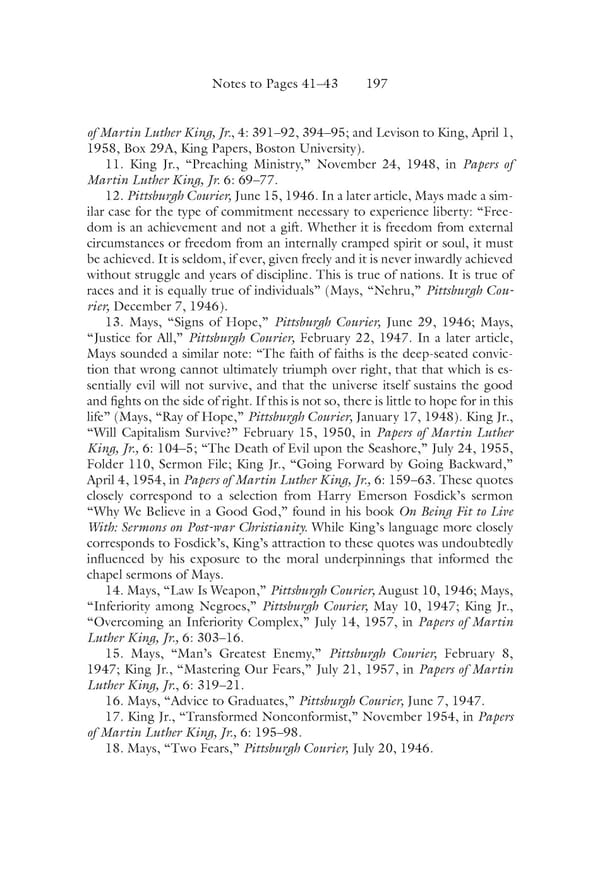Notes to Pages 41–43 197 of Martin Luther King, Jr., 4: 391–92, 394–95; and Levison to King, April 1, 1958, Box 29A, King Papers, Boston University). 11. King Jr., “Preaching Ministry,” November 24, 1948, in Papers of Martin Luther King, Jr. 6: 69–77. 12. Pittsburgh Courier, June 15, 1946. In a later article, Mays made a sim- ilar case for the type of commitment necessary to experience liberty: “Free- dom is an achievement and not a gift. Whether it is freedom from external circumstances or freedom from an internally cramped spirit or soul, it must be achieved. It is seldom, if ever, given freely and it is never inwardly achieved without struggle and years of discipline. This is true of nations. It is true of races and it is equally true of individuals” (Mays, “Nehru,” Pittsburgh Cou- rier, December 7, 1946). 13. Mays, “Signs of Hope,” Pittsburgh Courier, June 29, 1946; Mays, “Justice for All,” Pittsburgh Courier, February 22, 1947. In a later article, Mays sounded a similar note: “The faith of faiths is the deep-seated convic- tion that wrong cannot ultimately triumph over right, that that which is es- sentially evil will not survive, and that the universe itself sustains the good and fights on the side of right. If this is not so, there is little to hope for in this life” (Mays, “Ray of Hope,” Pittsburgh Courier, January 17, 1948). King Jr., “Will Capitalism Survive?” February 15, 1950, in Papers of Martin Luther King, Jr., 6: 104–5; “The Death of Evil upon the Seashore,” July 24, 1955, Folder 110, Sermon File; King Jr., “Going Forward by Going Backward,” April 4, 1954, in Papers of Martin Luther King, Jr., 6: 159–63. These quotes closely correspond to a selection from Harry Emerson Fosdick’s sermon “Why We Believe in a Good God,” found in his book On Being Fit to Live With: Sermons on Post-war Christianity. While King’s language more closely corresponds to Fosdick’s, King’s attraction to these quotes was undoubtedly influenced by his exposure to the moral underpinnings that informed the chapel sermons of Mays. 14. Mays, “Law Is Weapon,” Pittsburgh Courier, August 10, 1946; Mays, “Inferiority among Negroes,” Pittsburgh Courier, May 10, 1947; King Jr., “Overcoming an Inferiority Complex,” July 14, 1957, in Papers of Martin Luther King, Jr., 6: 303–16. 15. Mays, “Man’s Greatest Enemy,” Pittsburgh Courier, February 8, 1947; King Jr., “Mastering Our Fears,” July 21, 1957, in Papers of Martin Luther King, Jr., 6: 319–21. 16. Mays, “Advice to Graduates,” Pittsburgh Courier, June 7, 1947. 17. King Jr., “Transformed Nonconformist,” November 1954, in Papers of Martin Luther King, Jr., 6: 195–98. 18. Mays, “Two Fears,” Pittsburgh Courier, July 20, 1946.
 Becoming King: Martin Luther King Jr. Page 217 Page 219
Becoming King: Martin Luther King Jr. Page 217 Page 219